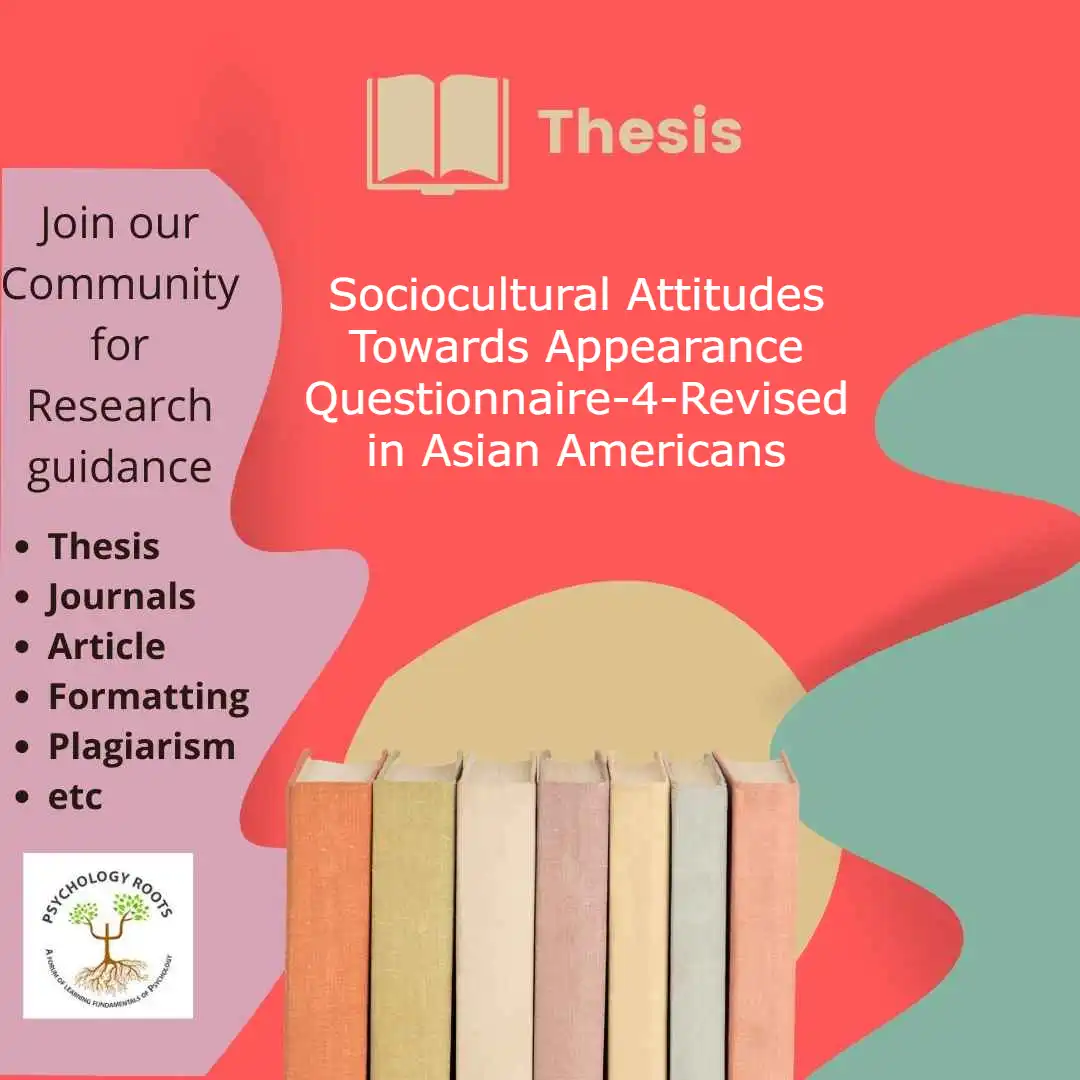Table of Contents
Sociocultural Attitudes Towards Appearance Questionnaire-4-Revised in Asian Americans
Here in this post, we are sharing the full Psychology thesis on “Sociocultural Attitudes Towards Appearance Questionnaire-4-Revised in Asian Americans“. You can read the abstract of the thesis with a download link. We have thousands of thesis in our collection (See articles). You can demand us any article related to psychology through our community, and we will provide you within a short time. Keep visiting Psychology Roots.
Abstract of the thesis
Prior research has indicated that the prevalence of eating disorders, which are recognized as one of the most lethal psychological disorders with an approximately 20% mortality rate, is increasing among Asian Americans with rates comparable to those of the general population in the United States. However, research has also suggested that Asian Americans may not be fully reporting symptoms related to eating disorders because of socio-cultural stigma and the desire to uphold cultural values, such as interdependence, harmony within the community, humility, and emotional restraint. The SATAQ-4R is a widely-used measure of sociocultural influences on body image and eating disturbance, which includes different forms for females and males.
However, few studies have performed a psychometric evaluation of the SATAQ-4R among Asian Americans. Thus, the aims of the current study were to explore the factor structure of the SATAQ-4R and evaluate the reliability and validity of the SATAQ-4R in Asian American women and men. Participants were 97 Asian Americans (61.9% female), aged 18-25 (M = 20.87, SD = 2.29), and a mean BMI of 24.70 (SD = 5.49) recruited from university subject pools as well as the community via flyers. A confirmatory factor analysis was conducted to test the factor structure of the SATAQ-4R-Female and Male, and convergent validity was measured using Pearson product-moment correlation coefficients between the SATAQ-4R subscales and the EDEQ, EDI-3-BD, MBSRQ-AE, and RSES. Fit indices indicated that the SATAQ-4R-Female and Male were not well fit for the data in Asian American women and men.
However, both the SATAQ-4R-Female and Male demonstrated adequate overall convergent validity in Asian American women and men. Results support previous research on eating disorders and body image disturbance in Asian Americans, indicating that there may, indeed, exist sociocultural influences that are different for Asian Americans than for those of other ethnic groups. However, the current study consisted of small sample sizes of females and males and therefore, results should be interpreted with caution and further study involving larger samples are needed. Further research could provide valuable information on how to address eating disorders among Asian Americans in a culturally appropriate manner.
Researcher of the Thesis
- Dean Lim
Avail Thesis [sociallocker id=64051]
[/sociallocker]
Need help in Research:
Are you struggling in research? Don’t Worry, We provide you with complete guidance and support free and quickly. Just need to create a query in our community. We also offer paid services such as:
- Thesis writing
- Article writing
- Statistical analysis
- Reference according to APA
- APA Formatting
- Supervisions
- Courses and Training
Contact us for the best quality free and paid services. info@psychologyroots.com or (+92-3336800644)
Information:
The purpose of our website is only to help students to assist them in finding the best suitable instrument for their research especially in Pakistan where students waste a lot of time in search of the instruments. It is totally free of cost and only for creating awareness and assisting students and researchers for good research. Moreover, it is necessary for you to take the permission of scales from their representative authors before use because copyrights are reserved by the respected authors.
Help Us Improve This Article
Did you find an inaccuracy? We work hard to provide accurate and scientifically reliable information. If you have found an error of any kind, please let us know.
Add comment. we appropriate your effort.
If you have any scale or any material related to psychology kindly share it with us at psychologyroots@gmail.com. We help others on behalf of you.
Follow
